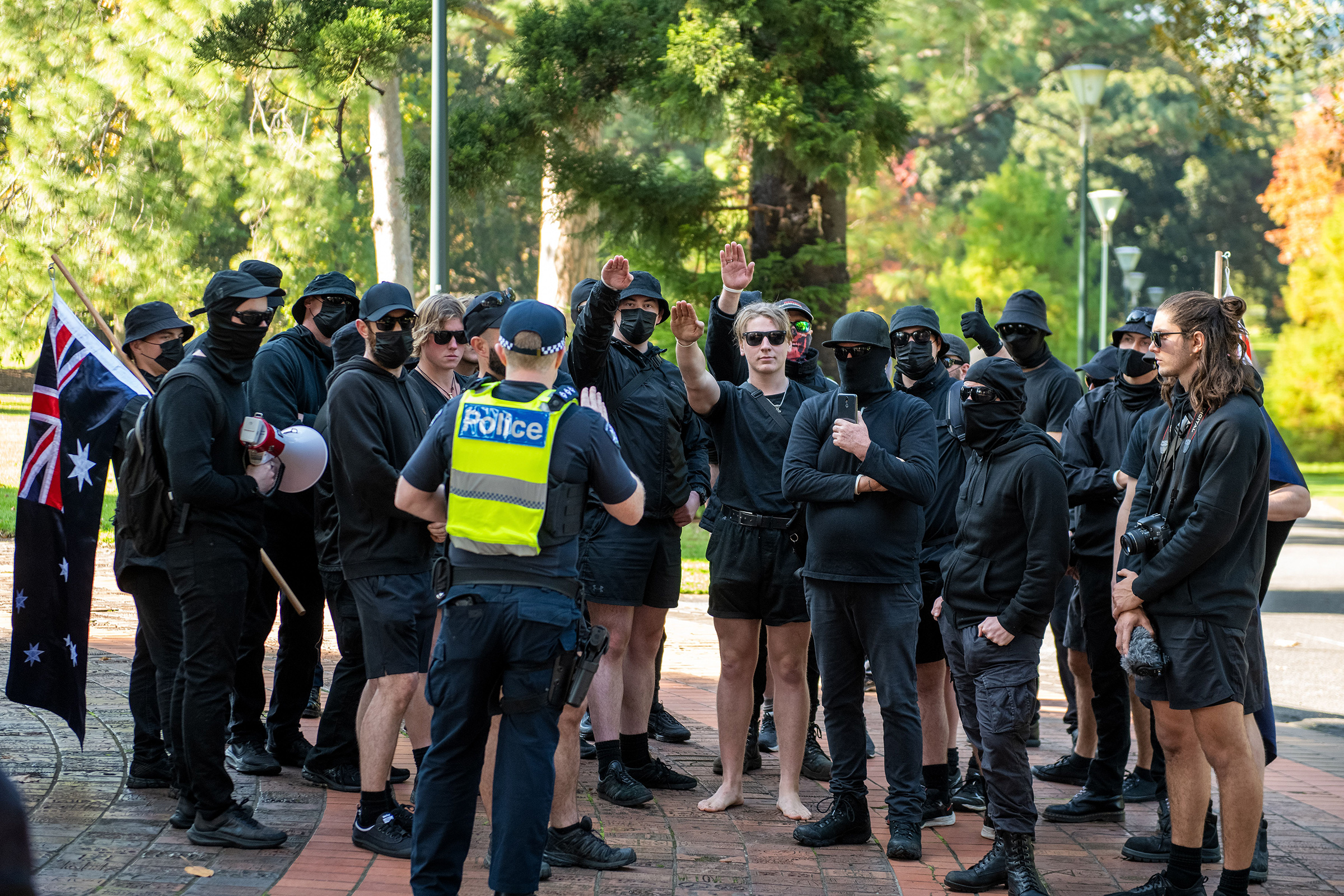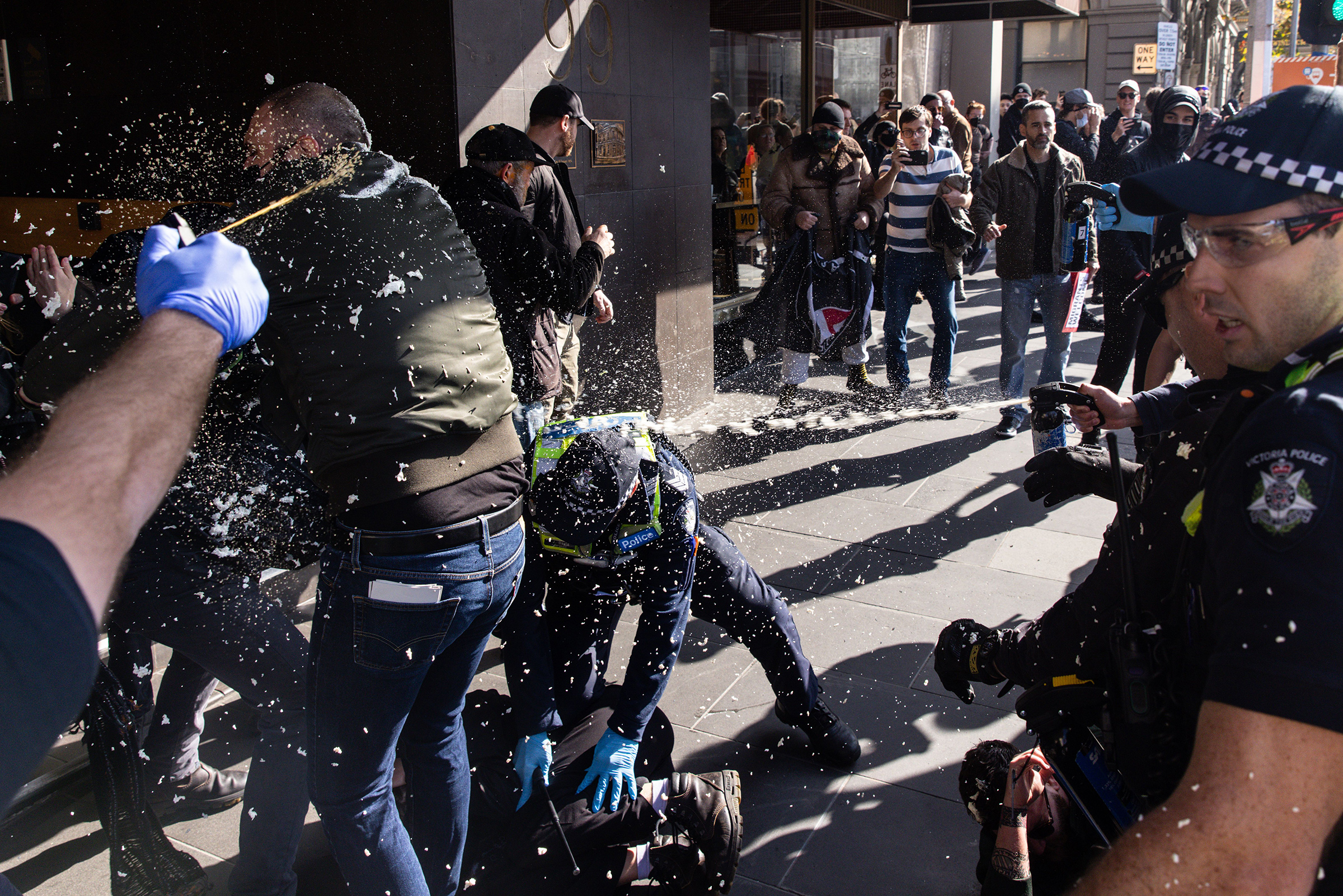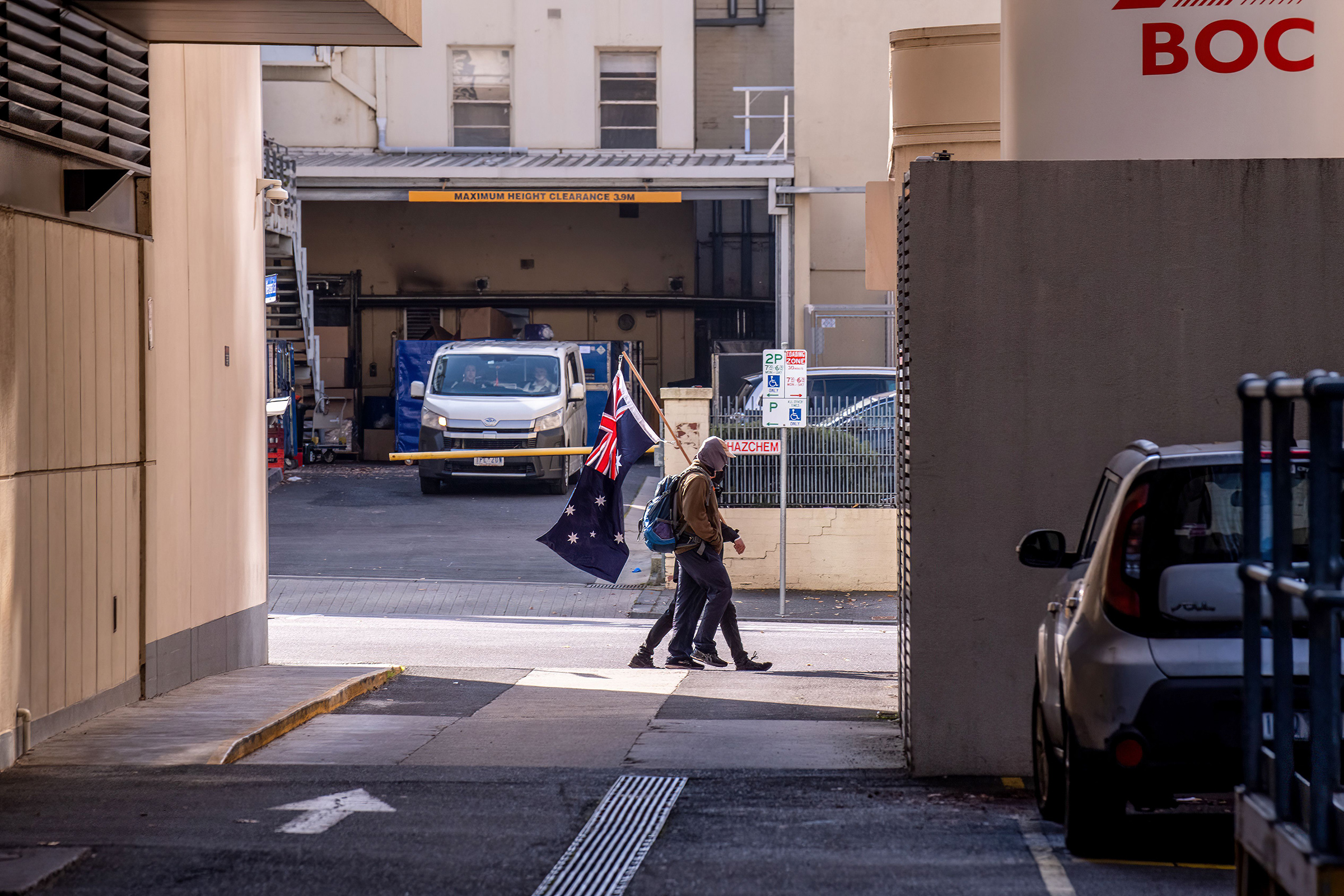
In March, a group of emboldened neo-Nazis in Melbourne began making a number of public appearances in a bid to recruit more members across Australia—first, at an anti-immigration rally, then, at an anti-transgender rights one—where they wore all black and proudly performed Nazi salutes. It was the latest example of far-right groups on the rise after Australia’s security chief issued a warning in February that neo-Nazis have emerged as one of the most challenging national security threats over the past year.
Now, the Australian government is trying to tackle the problem by placing a ban on swastikas and other Nazi symbols. “There is no place in Australia for symbols that glorify the horrors of the Holocaust,” Australian Attorney General Mark Dreyfus said on June 8.
The new bill was introduced in Parliament this week and seeks to ban the trade and public display of the swastika or Schutzstaffel (SS) symbols on flags, armbands, T-shirts, and insignia, as well as the online publication of symbols promoting Nazi ideology.
“Extremist insignia are an effective propaganda tool because they are easy to remember and understand,” Dreyfus told lawmakers in Canberra on Wednesday. “The [Prime Minister Anthony] Albanese Government is taking a significant step towards sending a message that Australia is united against displays of hate.”
Below, what to know about the rise of far-right extremism in Australia, and the government’s attempts to curb it.
Are neo-Nazis on the rise in Australia?
In February, Mike Burgess, the head of the Australian Security Intelligence, delivered an annual national threat assessment where he said that “small cells” of right-wing extremists were contributing to foreign espionage and interference activities more than ever before.
Last year, a team of independent researchers analyzed 673 incidents of antisemitism across Australia from 2013 to 2017 and found a significant increase following the establishment of one hate group. In a 2020 report, the Executive Council of Australian Jewry found that from 2019 to 2020, there was a marked increase in the number of serious incidents in Australia, including physical assaults and verbal abuse.

Meanwhile, research by “Tackling Hate,” an Australian initiative, found that one in four Australians had experienced discrimination motivated by their race and ethnicity, gender, disability, or religion in the last 12 months.
Experts tell TIME that the recent resurgence of far-right activism in Australia can be traced back to 2015 and coincides with the presidential campaign of Donald Trump, who campaigned on a platform that emboldened white nationalists. According to Josh Roose, a political sociologist who studies extremism at Deakin University in Melbourne, Australian far-right groups have drawn inspiration from similar ideologies that gained momentum in the U.S. during this time.
“We’ve had a number of local groups model themselves on the Proud Boys, for example,” Roose says.
Read More: The Billionaire and the Bigots
In 2020, during the COVID-19 pandemic, two far-right groups called the Lads Society and the Antipodean Resistance reportedly combined to form the National Socialist Network (NSN) and established its base in the state of Victoria. NSN tapped into public anger over pandemic restrictions—Australia enacted some of the world’s strictest measures—as many Australians took to the streets to participate in anti-lockdown protests. In Melbourne, which underwent six consecutive lockdowns, neo-Nazis appeared at the protests to spread their message and recruit new members.
Today, the core group of far-right activists appears small in public but has a robust online presence. “It’s a perfect storm of factors that have led to these groups gaining a little bit of prominence,” Roose says. “What you don’t want is extremist fringe movements becoming a mainstream movement.”
What does the new bill entail?

The Counter-Terrorism Legislation Amendment (Prohibited Hate Symbols and Other Measures) Bill would ban the display and trade of the swastika, the most recognizable symbol of the Nazis, as well as the insignia of the SS, the Nazi party’s paramilitary wing. (It also bans display of the flag or symbols resembling the flag of the terrorist organization known as the Islamic State, or ISIS.) Offenders face a maximum penalty of up to 12 months in prison.
The legislation does not cover the Nazi salute, which local police already have the power to crack down on. “State governments have got more responsibility for what you might call street offenses… the salute we’ve left for the states,” Dreyfus said during the June 8 announcement, a reference to bans enacted by Victoria and Queensland earlier this year.
The proposed ban also makes exceptions for the “legitimate” display of the swastika—an ancient Sanskrit symbol facing the opposite direction in Hinduism, Buddhism, and Jainism that was hijacked by the Nazis—from religious, artistic, literary, scientific, journalistic, and academic contexts. “Public display for the purposes of education is permitted so the horrors of the Second World War are not forgotten and can continue to be taught as a lesson for future generations,” Dreyfus said on June 14.
While most Australian states have already instituted separate bans on Nazi symbols, the new bill goes further by targeting any sales of clothing, items, or memorabilia. Attorney-general Dreyfus added that it would bolster state efforts by ensuring there were “no loopholes” left to exploit. “There’s no place in Australia for spreading of hatred and violence,” he said last week.
Will the ban be effective?
The answer is complicated. Some experts say that such bans treat symptoms of a larger problem, rather than the problem itself.
“They’re effectively playing whack-a-mole by hitting far-right extremists as they pop up in different manifestations around the country,” says Deaking University’s Roose. “But there’s a much deeper societal issue here that’s giving rise to these movements.”
Robert Kahn, a law professor who studies hate speech at the University of St. Thomas in Minnesota, says such bans can still be effective by having a no-tolerance approach toward hate speech. He also points to an argument made in the U.S. Supreme Court by Justice Louis Brandeis: “Sunshine is the best disinfectant, meaning that a society is better off knowing that they have a neo-Nazi issue, rather than pushing it under the carpet.”
Libertarian views on free speech that are popular in the U.S. haven’t had the same historical resonance in Australia, says Roose. But certain acts are only deemed as terrorism and violent extremism when “they cross the threshold to call for violence.” He adds that far-right groups have often “exploited loopholes” by carefully crafting their language and making calls for violence more implicit “so that they can have plausible deniability.”
The new bill hopes to crack down on these loopholes and was announced after widespread consultation with security agencies, communities, academics, and other relevant stakeholders.
Dvir Abramovich, chairman of the Australian Anti-Defamation Commission, told the BBC that the recent presence of neo-Nazis on Australia’s streets took Holocaust survivors “back to their darkest days.” He described the proposed ban as “a profound moment” and said it was a step in the right direction to deal with “hardcore bigots.”
Which other countries have similar bans?
Most bans or restrictions on Nazi symbols are found in Europe, particularly in Germany and Austria. In Germany, swastikas and SS sig runes are considered unconstitutional and their display or sale is illegal. The Nazi salute and statements such as “Heil Hitler” are also banned in public. Similar, though less restrictive, bans also exist in France, Latvia, Ukraine, Russia, Poland, Lithuania, and Hungary.
No such bans exist in the U.S. The Nazi symbol has also not been banned in Canada and New Zealand, though experts say these two countries may follow in Australia’s footsteps.
More Must-Reads from TIME
- Cybersecurity Experts Are Sounding the Alarm on DOGE
- Meet the 2025 Women of the Year
- The Harsh Truth About Disability Inclusion
- Why Do More Young Adults Have Cancer?
- Colman Domingo Leads With Radical Love
- How to Get Better at Doing Things Alone
- Michelle Zauner Stares Down the Darkness
Write to Astha Rajvanshi at astha.rajvanshi@time.com